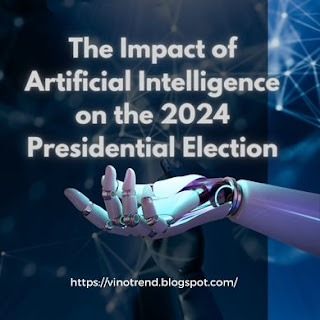The Impact of Artificial Intelligence on the 2024 Presidential Election
As the 2024 presidential election approaches, political campaigns are looking towards the potential benefits of artificial intelligence (AI) and its potential to revolutionize the political landscape. However, concerns about the ethical implications of AI in political campaigns, such as data privacy and the manipulation of public opinion, continue to arise. In this article, we will explore the role of AI in voter data analysis, the difficulty of authenticity verification, the ethics of using AI in political campaigns, the impact on public opinion, and the future of political campaigning.
.jpg)
The Role of AI in Voter Data Analysis
AI technology can analyze vast amounts of data quickly and efficiently. With access to voter data, AI can identify potential supporters and develop targeted campaign messages that are more likely to resonate with specific demographics. This gives candidates a significant advantage in reaching potential supporters, resulting in a more effective campaign strategy. However, the use of personal data in political campaigns raises concerns about the privacy of voter data and its potential misuse.
The Increasing Difficulty of Authenticity Verification
The rise of deepfake technology, a form of AI, is making it increasingly challenging to verify the authenticity of political messages and campaign ads. Deepfake technology allows the creation of realistic videos and audio recordings of individuals saying things they never actually said. This could lead to a loss of trust in the political process and undermine the democratic process. It becomes increasingly crucial to ensure that political messages and campaign ads are genuine and not manipulated by AI technology.
The Ethics of Using AI in Political Campaigns
As the use of AI in political campaigning becomes more widespread, there is an urgent need for ethical guidelines to ensure responsible use. This includes issues such as the use of personal data, the transparency of campaign messaging, and the impact of AI on the democratic process. The Federal Election Commission (FEC) must develop strict regulations on the use of AI in political campaigns to ensure the preservation of democratic values and prevent the misuse of technology.
Furthermore, there is a risk that AI could be used to create fake news stories or manipulate social media algorithms to spread false information. This could have a significant impact on public opinion and undermine the credibility of the political process. It is essential to have regulations and policies in place to prevent the misuse of AI technology in political campaigning.

The Impact on Public Opinion
AI technology can analyze vast amounts of data, allowing campaigns to create targeted messages that are more likely to resonate with specific demographics. However, this also means that political messages and ads could be designed to appeal to specific groups of people, possibly resulting in the manipulation of public opinion. This could lead to a distorted view of the issues, further polarizing the electorate and undermining the democratic process.
The Future of Political Campaigning
As technology continues to evolve, so will its impact on political campaigning. While AI has the potential to transform the way campaigns are run, it is essential to consider its ethical implications carefully. The potential benefits of AI in political campaigns must be weighed against the risks of privacy breaches, loss of public trust, and the potential for manipulation.
FAQs:
Q. Will AI completely take over the political campaigning process in 2024?
While AI will undoubtedly play a significant role in political campaigns, it is unlikely that it will completely replace human decision-making. There will still be a need for human oversight to ensure ethical use of AI technology.
Q. Can AI help improve voter turnout in elections?
Yes, AI can help identify potential supporters and create targeted messaging that can encourage voter turnout. However, it is crucial to use this technology ethically and transparently to prevent any possible manipulation of public opinion.
Q. Is there any way to prevent the misuse of AI technology in political campaigning?
The Federal Election Commission (FEC) must develop strict regulations on the use of AI in political campaigns to ensure ethical and responsible use of technology. Additionally, it is important to have transparency and accountability in the use of personal data in political campaigns.
Q. What is deep fake technology, and how can it impact political campaigns?
Deep fake technology allows the creation of realistic videos and audio recordings of individuals saying things they never actually said. This could be used to spread false information and manipulate public opinion, which could undermine the credibility of the political process.
Q. What can voters do to protect their personal data during political campaigns?
Voters should be cautious about providing personal data to political campaigns and should only do so if they trust the campaign to use their data ethically and transparently. It is also important to pay attention to privacy policies and to regularly review and update privacy settings on social media platforms.
As the use of artificial intelligence (AI) technology becomes more prevalent, its potential impact on political campaigning has become a hot topic of discussion. The 2024 presidential election is already shaping up to be heavily influenced by AI, with candidates and policymakers scrambling to develop strategies to utilize this technology effectively.
While AI can provide significant advantages in terms of voter data analysis and personalized messaging, it also poses ethical concerns that must be addressed. One of the most significant advantages of AI in political campaigns is its ability to analyze vast amounts of data quickly and efficiently. With access to voter data, AI can identify potential supporters and develop targeted campaign messages that are more likely to resonate with specific demographics.
However, this also raises concerns about the privacy of voter data and the possibility of its misuse. As the use of AI in political campaigning becomes more widespread, there is an urgent need for ethical guidelines to ensure responsible use. The Federal Election Commission (FEC) must develop strict regulations on the use of AI in political campaigns to ensure the preservation of democratic values and prevent the misuse of technology.
Moreover, the rise of deepfake technology is making it increasingly challenging to verify the authenticity of political messages and campaign ads. This could lead to a loss of trust in the political process and undermine the democratic process. It becomes increasingly crucial to ensure that political messages and campaign ads are genuine and not manipulated by AI technology.
As technology continues to evolve, so will its impact on political campaigning. While AI has the potential to transform the way campaigns are run, it is essential to consider its ethical implications carefully. The potential benefits of AI in political campaigns must be weighed against the risks of privacy breaches, loss of public trust, and the potential for manipulation.
In conclusion, AI technology will undoubtedly play a significant role in the 2024 presidential election. While it can provide significant advantages in terms of voter data analysis and personalized messaging, it also poses ethical concerns that must be addressed. As we look ahead to the 2024 presidential race, it is crucial that political candidates and policymakers consider the impact of AI on the democratic process and work to ensure that it is used responsibly.





0 Comments